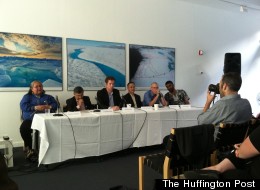
From left: Caroline Cannon, Inupiat leader and 2012 Goldman prize winner; K. Subramanya, chief executive officer at Tata BP Solar India Ltd.; Bryan Walsh, senior energy and environment writer for Time; Surendra Shrestha, regional director for Asia and the Pacific region of the UNEP; Bill McKibben, co-founder of 350.org, and Kumi Naidoo, executive director of Greenpeace International.
by Joanna Zelman and James Gerken, Huffington Post, September 19, 2012
As Arctic sea ice levels hit a new record low this month, scientists and activists gathered to discuss how to bridge the gap between scientific facts and the public's limited understanding that we are, in their words, "really running out of time."
The National Snow and Ice Data Center (NSIDC) released preliminary findings Wednesday suggesting that on Sept. 16, Arctic ice covered just 1.32 million square miles -- the lowest extent ever recorded. This minimum is 49 percent below the 1979 average, when satellite records began.
“The loss of summer sea ice has led to unusual warming of the Arctic atmosphere, that in turn impacts weather patterns in the Northern Hemisphere, that can result in persistent extreme weather such as droughts, heat waves and flooding,” NSIDC scientist Dr. Julienne Stroeve told Greenpeace in a press release.
Wednesday morning, a group of climate scientists and activists met at a Greenpeace International panel in New York to strategize on potential responses to the changing Arctic climate.
"There's a huge gap between what is understood by the scientific community and what is known by the public," NASA scientist James Hansen said, adding that he believed, "unfortunately, that gap is not being closed."
What the scientific community understands is that Arctic ice is melting at an accelerated rate -- and that humans play a role in these changes.
According to the panel, humans are "really running out of time" to prevent atmospheric carbon dioxide concentrations from reaching levels that would precipitate runaway climate change. Hansen warned that even maintaining current concentrations of approximately 390 parts per million for several centuries "guarantees disaster."
He attributed the rise in carbon dioxide concentrations largely to the burning of fossil fuels. "It's crystal clear. If we burn all the fossil fuels, we create certain disaster," he said.
Despite the fact that "we have a planetary emergency," Hansen explained, "It's hard for the public to realize, because they stick their head out the window and don't see much going on."
Having just witnessed climate change in action on an Arctic campaign, Greenpeace International head Kumi Naidoo professed, "I am shit scared." Despite the fact that the Arctic seems far away, Naidoo said, "What happens in the Arctic doesn't stay in the Arctic."
In order to appeal to the public, Naidoo said climate change language must become more relatable. For example, on a recent campaign, he changed a banner at the last minute from "Stop Arctic Destruction" to "Don't Destroy Our Children's Future."
Beyond altering language, 350.org founder Bill McKibben said engaging the younger generation is key. He explained the importance of limiting our fossil fuel "appetites" and pressuring the industry directly through student divestment campaigns and a fee and dividend mechanism.
"Because of [the fossil fuel industry's] wealth and political power, they've been able to remain the only industry on Earth that doesn't have to clean up after themselves. There's no price on carbon," McKibben later told HuffPost.
His proposal to increase the cost of carbon emissions -- one also advocated by Hansen -- would involve collecting a fee on all oil, gas and coal resources at the point of domestic extraction or their port of entry. A dividend would then be equally split among all legal residents, with none of the funds going to the government. McKibben and others argue that this market-based approach would promote innovation and awareness without increasing the size of government.
According to McKibben, the carbon fee must be high enough to keep 80% of known fossil fuel reserves in the ground.
Assessing the melting Arctic ice and other recent climate observations, McKibben noted, "The final irony is we're at the first moment in human history where we're able to see what's going on ... the question is whether we're going to do anything about it."







No comments:
Post a Comment